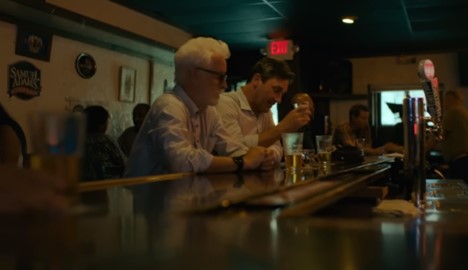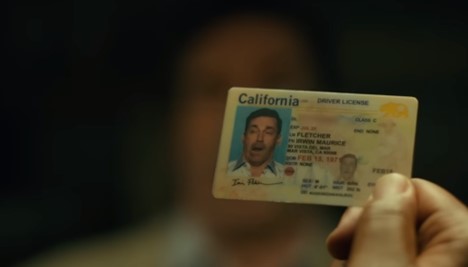The viewer of Confess, Fletch has to reconcile an immediate dichotomy. The setting is Boston, a place full of Wahlbergs and aggressive townies, but the first person we see is one Irwin M. “Fletch” Fletcher, a guy who is renting an AirBnb in the ritzy South End and is more unforgivably wearing an LA Lakers hat. Not merely the Dodgers (or the Raiders? Rams? Chargers? Who even plays football there these days?), but the greatest West Coast enemy of this proudly Puritan city. The hat turns out to be a surprisingly significant plot point, but it’s also a statement of purpose — the man wearing it will not just nonchalantly phone in a murder in his rental unit, but also take his shoes off when he talks to the cops. He’s on his own wavelength.
Confess, Fletch is also on a singular wavelength, one that used to to be tuned across the country but is now harder to find. Greg Mottola’s film is an actual adult comedy, the kind of picture that gives no shits for an adolescent or pre-teen audience but still would, in a more perfect world, attract teens looking for solid jokes. The kind of 80s comedy that produced the original Fletch, an adaptation of the long-running book series that gave Chevy Chase an opportunity to goof all over the place and find an apparent immortality on basic cable. The world has moved on, comedies are now series and funny movies are dumped onto streaming networks instead of gaining audiences in the theater or on rental services. There is no better way for a funny thing to catch on than by actual people trying to tell its jokes, vibing with the other people who know and insisting the outsiders get on the same page. And yet this has been unceremoniously dumped into a world no longer waiting for its pleasures. Confess, Fletch! You’re trying to pump air into a deflated genre, but it’s not your fault.

Here’s a confession: I’ve never seen the original Fletch, nor read the books. This series — brand? — holds no appeal for me on an extratextural level. What I do appreciate is Jon Hamm as a comedic actor and he is excellent here, a guy moving through a twisty mystery and happy to drop a few twists of his own. Anyone who watched Mad Men (the not-so-secret best TV comedy of the past 20 years) knows Hamm’s comedic chops, and also how he needs to play behind the beat to make the most of them. He’s a good actor but a better reactor.
And Confess, Fletch, throws him up against ringer actor after ringer actor. Kyle MacLachlan is a germophobe art dealer, Lucy Punch is an Instagram idiot, the wonderful Kenneth Kimmins is a bloviating boatsman. Ayden Mayeri and Roy Wood, Jr. are duped cops, Marcia Gay Harden is a ridiculous Italian countess. Hamm’s best bud John Slatterly is an asshole newspaper editor who insults a guy for creating the Jumble; it’s hilariously cruel and a great Roger Sterling line for 2022.
Confess, Fletch understands that a detective story has a mystery as its structure in the way you need a Christmas tree to hang your ornaments — the plot lets the characters sparkle and shine, and Hamm (like comedy gods Chase and Bill Murray before him) is confident enough to give them space for their scenes. There is a huge difference between saying funny things and saying things funny, the former is constructing jokes and the latter is constructing dialogue that trusts the actor to take the words beyond the page into a place where the person watching has no choice but to crack up. Confess, Fletch embraces both of these, but is especially sensitive to the latter.
Nowhere is this more apparent than an early scene with Annie Mumolo, the co-writer of Bridesmaids and an actress who’s been around for a while and co-starred in Barb and Star Go To Vista Del Mar. Mumolo’s Eve lives next door to the unit Hamm’s Fletch is renting, where he found a dead woman who Fletch is now suspected of murdering, and yet she invites Fletch over for dinner. What follows is an increasingly insane scene of Eve making a horrible meal (at one point cutting her hand open chopping chicken) while blithely spilling exposition beans to Fletch, who watches with increasing discomfort but can’t exit the scene without being a rude jerk. Mumolo is an incredible space cadet here, bleeding all over the place while still being concerned about the meal she serves to her dog, but the scene isn’t just cringe comedy. It’s funny just because of how Fletch reacts, but also because of the precision in Mottola and Zev Borow’s script and Mumolo’s performance. This isn’t people improving to a goofy end, it’s an actual, honest-to-god comedy scene.

When Eve invites Fletch in she puts on some music, specifically the fantastic (and horny) X song “True Love Pt. 2.” It’s one of the best songs from the great L.A. punk band (as opposed to a tune from a more local group, like Gang Green or the Freeze) and it points to a certain direction here, that Eve in another incarnation would be a California burnout, one visited by Elliot Gould perhaps. Confess, Fletch is a very relaxed movie that, as other critics have pointed out, follows the Chandlerian and therefore L.A.-based crime setup of a detective interviewing suspects in their preferred environments on the way to solving the crime — Hamm is more traditionally (i.e. WASPily) handsome than Gould, but they both are OK with a lot of things as they move through different worlds checking alibis. But Hamm is on the other side of the country here.
The cliche of Boston townie crime looms very large at this point. THA TOWN, KHED. Confess, Fletch draws immense strength from ignoring this completely and instead playing entirely in the rich world of art assholes and yacht fuckheads. Mottola does a fair amount of filming in New York but got a lot of exteriors in Boston, and the Hub is a place where Southie is not the South End. The wealthy have a different world and showing that without aw-shucks faux-humility is its own reality. Fletch may be from La-La land, but he can see very clearly how money lets people get away with things here and how at a certain level, the signifiers of money are their own alibi. If you docked here, you’d be home by now.
Confess, Fletch seeks and finds a remarkable balance. A Los Angeles investigative reporter comes to the East Coast and flummoxes the straitlaced cops, but is also goofed on by the moneyed dopes in Beantown (and Italy).Tthings come out right at the end, justice is served to the worst among us, but various small crimes are overlooked. A West Coast noir would revel in despair and failure while an East Coast crime flick would punish the guilty and have no mercy for anyone not purely innocent. The area between this might be called the middle ground, or maybe the mainstream. An actual mainstream would be accessible to the average viewer though, and the studio has dumped Confess, Fletch into a world where a person who could have walked into a theater in 1985 and caught a fun comedy flick now has to subscribe to the right service for the most basic pleasure of a fun movie made for grown-ups. Who’s going to solve this crime?

